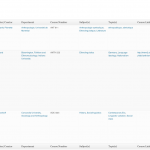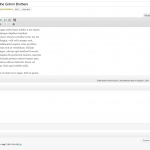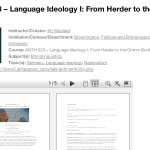Got lots more to blog, including something about “received knowledge”. And a list of things I love about Google. (I’m also getting started on “logical punctuation”, as you may already be noticing…)
But, at the risk of attracting trolls and Apple haters, I thought I’d post some notes from a daydreaming session. In some ways, it’s easier to write than the rest. And it’s more “time-sensitive”, in that my thoughts will likely sound very silly, very soon.
But I don’t care.
So, yes, this post is about iCloud, which will be officially unveiled in a few hours. No, it doesn’t mean that I expect anything specific from iCloud or that I trust Apple to deliver something awesome.
Contrary to what some people seem to think, I’m no Apple fanboi. I use a number of Apple products and I find several of them to be close to the ideal in my workflow, but I don’t have any sort of deep involvement in “the Cult of Mac”, Apple Inc., AAPL, or even Apple-focused development. I use the tools and like them, but I don’t think Apple will save us any more than will Facebook, Dell, Google, Amazon, Twitter, HP, or Microsoft.
[Automattic, on the other hand… 😉 ]
So, back to iCloud…
According to many, “cloud computing” (whatever that means) is a domain in which Apple has been relatively weak. I tend to share that opinion, despite the fact that a number of tools that I use have to do with either “the cloud”, Apple, or both. What might give trolls and haters some ammo is that I do have a MobileMe subscription. But there’s a lot I dislike about it and the only features I really find valuable are “over-the-air” syncing (henceforth “OTA”) and “Find My iPhone”. And since I use GSync on my iPod touch, MobileMe’s OTA isn’t that incredibly important. Depending on what iCloud may be, my MobileMe renewal (which comes up in a few days) could be a very hard sell. I don’t regret having it as it did help me retrieve my iPad. But it’s rather expensive if it’s the only thing it does. (Then again, so is insurance of any kind, but I digress…)
So, I’m no MobileMe poweruser. Why would I care about iCloud?
In some ways, I don’t. Or, at least, I didn’t. Until very recently, though I saw rumours about Apple’s new “cloud services”, I was only vaguely intrigued about it. I did think that it might solve my MobileMe issue. But I treated these rumours with a lot of skepticism and a rather low level of interest.
Yet, today, iCloud has been giving me a drift-off moment. Like Android did, at some point.
It’s not that I have predictions to make about iCloud. I’m not even speculating, really. But it got me to think. And, I admit, I enjoy thinking.
Without further ado (about nothing), my fanciful thoughts stemming from a short daydreaming session about iCloud…
The main thing people seem to be expecting (based on rumoured negotiations with music publishers) is a music streaming service similar to Music Beta by Google or a digital file storage service similar to Amazon Cloud Drive. Both of these are quite neat and I could see myself using something like this. But it’s not exactly what makes me dream. While iTunes integration might make Apple’s version of a music streaming service somewhat more useful than the others. Besides, rumours have it that, through agreements with the recording industry, iCloud might sync music without requiring long uploads. It’s quite possible that this only works with tracks purchased on iTunes, which would upset those whose expectations are high, but could already be useful to some.
Where I’m beginning to drift off, though, is when I start thinking about OTA for podcasts. It’s been high up on my wishlist, as a feature, and you might say that it’s a pet peeve with iOS devices for podcatching. Having to sync my iPod touch to my main desktop just to have my podcast list up-to-date is a major hassle. Sure, there are apps which sync podcasts OTA. Problem is, they can’t add podcasts to the native iOS media player, which is a dealbreaker in my case. (As absurd as it may sound to others, one reason this is a dealbreaker is that I now listen to everything at doublespeed. Hey, it’s my podcast library and I listen to it as I want, ok?)
So, OTA podcasts would constitute a significant enhancement to my experience. Nothing absolutely required and possibly not that significant for others, but it’d really help me in more ways than one could imagine.
Thing is, syncing my iPod touch isn’t just about podcasts, even though podcatching is my main motivation to sync. After all, I don’t listen to podcasts yet I still sync my iPad. So, what else? Well, backing up is the main other thing, and it might be one of the core reason for Apple’s implicit insistence on syncing. That’d be classic Apple. Data loss can be such a big problem that they’d “do what they can” to prevent users from losing data. Far from perfect, in my experience (I ended up having some problems when I lost my “iTunes Library” file). And quite annoying when it meant that the sync would take a very long time to finish at precisely the point when I’m trying to leave home. But a classic Apple move, even in the way Apple haters may mean it.
So OTA synchronization of the whole iOS device, and not just podcasts or music, would be a definite plus, in this perspective. If it does end up coming with iCloud, it’d provide support to the idea that the tethering of iOS devices to desktop computers is really about ensuring that users back up their devices…
…and stay up to date. Firmware updates aren’t that frequent, but they’re probably a major part of the equation for Apple.
But not so much for me. If OTA podcasts were available, I’d still sync my iOS devices on occasion, through whatever means necessary. In fact, were I to use an Android device, a backup app would be essential, to me. So still not much dreaming from the backup aspect of iCloud.
Although… Sync is much broader than preventing device-specific data loss and making sure your device has the latest firmware.
For one thing, it does encompass some of the aforementioned OTA functionalities in MobileMe. Useful, but still not dreamworthy.
We get a bit closer to a “dream come true” if we talk about Xmarks, a bookmark-sync service originally meant for Firefox. Sure, it sounds incredibly prosaic. But OTA bookmarks would open up a wide range of possibilities. This is about a qualitative difference from going OTA. In the case of backups, it’s about avoiding an annoyance but, arguably, it’s not really about changing something major about our behaviour. (Then again, maybe it is, with people who don’t back their devices up.) Point is, with something as simple as bookmarks, OTA is “disruptive”. At least, it gets me to daydream. One reason is that:
…no matter how fundamental they have been for the Web, links and bookmarks have yet to find their full value.
Hmm… Ok, perhaps a bit hyperbolic… So let me rephrase…
There’s still a lot to be done with URLs and, as simple as they are, I love thinking about links. Maybe I’m just obsessed with URLs.
As it so happens, I have a full list of thoughts about “link processing” and I’ve already blogged about related topics (on more than one occasion, in different contexts, going back to relatively early blogposts). And I even think social science can help.
I mean, think about it! There’s so much you can do, with links! Much of it is obvious, but I’d argue, rarely discussed. For instance, it’s very clear that we can post links pretty much anywhere. Doing so, we’re sharing their “content”. (In a semiotic sense, links are indices. I wish we can move from the “semantic Web” to the “semiotic Web”. But that’s another issue.) Sharing a link is the basic act of the social Web. It’s so obvious and frequent that it seems not to require discussion”.
Another obvious thing about links: we can measure the number of times they’re followed. In 2011, more than thirty years after hypertext has been introduced as a stable concept, much of the Web’s finances still relies on “clickthroughs”. Seems important.
And there’s a lot of processing which can be done with URLs: shortening them, adding them to “to do” lists, checking them for validity, keeping them in link libraries, archiving their “content”, showing them as external or internal links, preventing them from “rotting away”, showing the wordcount or reading time of the item they “target”, display them as QR codes, abuse them, etc.
As you can notice, it’s easy to get me on a tangent simply thinking about URLs. What’s this have t’do with iCloud, you ask? Probably not much, in terms of the actual service which will be announced at Moscone. But I’ve been dreaming about iCloud as a way to integrate Diigo, Instapaper, Delicious, reddit, digg, Slashdot, StumbleUpon, Spurl, The Nethernet, Xmarks…
Hey, I told you I was dreaming! Something as simple as managing, processing, sharing, and archiving links in iCloud could lead to just about anything, in my imagination.
And speaking of Xmarks… It’s now owned by Lastpass, a company which focus on password management. IMHO, some Lastpass-like features could make their way in diverse products, including iCloud. Is this far-fetched? Possibly. But secure handling of passwords can be a major issue in both of Apple’s new operating systems (Mac OS X Lion and iOS5). From “keychains” to SSO, there’s a lot of work to be done which relates to password management, in my mind.
Which leads me to think about authentication in general and the rumours about “deep Twitter integration in iOS 5”. (Not directly related to iCloud, but who knows?) Again, something which can send me (and others) on drift-off moments. What if this integration suddenly made iOS devices more useful in terms of social networking services? Something to ponder, if one has a propensity for pondering.
At the same time, given the relative lack of activity on iTunes Ping, I wouldn’t bet on Twitter integration having that major an impact by itself. Not unlike Google, Apple has a hard time making a mark on the social Web. Now, if Twitter integration does connect to everything else Apple does, it could lead to interesting things. A full-fledged online identity? Access to contacts for not only messaging and photo sharing but for collaboration, group management, and media sharing? Not betting on any of this, but it could be fun. Again, not specific to iCloud, but quite related to “The Cloud”. If Twitter integration is deep enough, in iOS 5, it’d be possible to use iOS devices for “cloud computing”, getting further into the “post-PC era”.
An iCloud feature which is expected by several people, is something like an OTA version of the “iTunes file sharing” feature in iOS. Several apps (especially Apple’s own apps) use iTunes and a USB cable to share files. It was a welcome addition to iTunes 9.1 but it’s rather inconvenient. So many other apps rely on Dropbox for file sharing.
Which leads me to dream about iCloud as a replacement for Dropbox. Sounds extremely unlikely that it’ll have the full Dropbox feature set, especially if one thinks about the “Pro 50” and “Pro 100” plans on Dropbox. But I dream of the day when Apple’s iDisk will compete with Dropbox. Not that I’m convinced it ever will. But it’d make Apple’s devices all the more useful if it did.
Something similar, which isn’t frequently discussed directly, in connection with iCloud rumours, but which would rock: Mozy– or Carbonite-style backup, for Mac OS X machines. Sounds very unlikely that Apple will ever offer something like this but, as crazy as it may sound, the connection between Time Capsule and iCloud would be great if it went that far. From a user’s perspective, the similarities between Time Machine backup and “backing up in the cloud” (à la Mozy/Carbonite) are quite obvious. The advantages of both are clear. And while no hardware announcement is supposed to make its way to the WWDC 2011 keynote, I’d give the Time Capsule some consideration if it provided me with the equivalent of what I currently have with Mozy. Not to mention that Mozy has already sparked some drift-off moments, in me, before they announced their new plans. What if I could have a single service which combines features from Mozy, Time Machine, Dropbox, and YouSendIt?
I even think about the possibilities in terms of web hosting. As it stands, MobileMe does allow for some Web publishing through the iWeb application in its iLife suite. But iWeb has never been a major effort for Apple and it hasn’t been seen a significant update in quite a while. What if iCloud could become a true webhost just like, say… iWeb.com? (Semi-disclaimer: I won a free account with iWeb.com, last Fall, and I host some sites there. I also know some of the people who work there…)
Yet again, I don’t expect this to happen. It’s not speculation, on my part. It’s a daydream.
The reason this makes me dream is that I find all these things to be related and I wish they were integrated more seamlessly. Something about which Apple haters may not care much is the type of integration represented by iTunes. As clunky as iTunes may be, in some respects, it’s quite a success in terms of integrating a lot of different things. In fact, it probably overextended its reach a bit too much and we need to replace it. Apple needs to replace iTunes and we should also replace iTunes in our lives.
Like Gruber, I end up thinking about iCloud in relation to iTunes more than in relation to MobileMe. But I also dream about the ideal cloud service, which would not only sync and backup files between iOS devices, hundreds of millions of iTunes store accounts, and Macs, but replace several of the services for which I’m paying monthly fees.
Here’s to dreaming…
Other parts of this crazy, iCloud-infused daydream, in notes form:
- Authentication and payment systems
- Twitter and identity: verified, private/public, pseudonym, tied to credit card
- GarageBand as collaborative musicking
- Soundcloud as model for creation, user engagement, sharing
- Interactive podcasts and annotations
- Group collaboration through iWork
- Replacing iWork.com
- Sync, share, and manage user-generated content
- SimpleText.ws Sync for Hog Bay Software (Taskpaper, WriteRoom)
- Competing with Amazon S3
- Media sync: retrieve Genius-recommended tracks, wishlists, buy later…
- Whispersync-like for diverse media, including podcasts, TV series, movies, iBooks…
- Streaming media makes DRM and device capacity moot?
- PIM features: integrating contacts from Address Book, Twitter, Skype…
- iSync revival
- Rich notes, sync, publishing
- Voicenotes
- Evernote-like capture and processing
- Reading list items archived, summarized, reformatted, cached…



